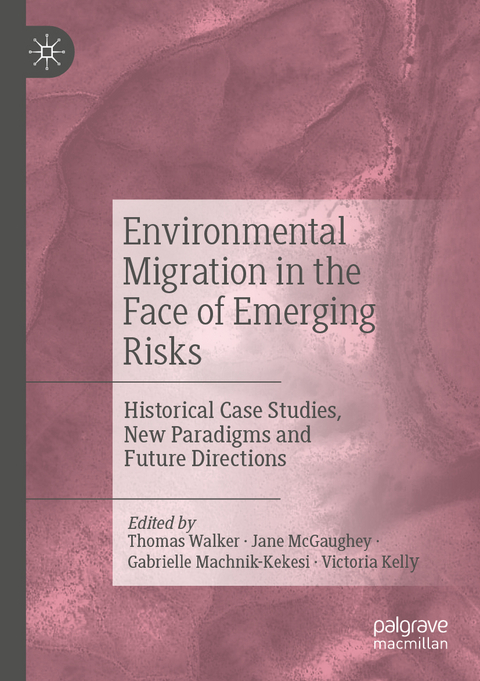
Environmental Migration in the Face of Emerging Risks
Springer International Publishing (Verlag)
978-3-031-29531-7 (ISBN)
This book is composed of five clear sections. The introductory section includes one chapter that presents an overview of the current landscape, the scope and objectives of the book, as well as its specific approach and the various themes. The concluding section is composed of one chapter that presents a global map of recent innovations drawing together some of the core themes discussed throughout the book. The concluding chapter synthesizes the challenges and opportunities presented, and the possible future directions that researchers, practitioners, and regulators could and should move towards.
Thomas Walker holds a BSc in Management Information Systems from the Technical University of Darmstadt, Germany, and an MBA and PhD degree in Finance from Washington State University. Prior to his academic career, he worked for several years in the German consulting and industrial sector at such firms as Mercedes Benz, Utility Consultants International, Lahmeyer International, Telenet, and KPMG Peat Marwick. His research interests are in emerging risk management, corporate finance, venture capital, sustainability & climate change, fintech, corporate governance, securities regulation and litigation, insider trading, and institutional ownership, and he has published over 70 articles, book chapters, and edited books in these areas.
Jane McGaughey is the Johnson Chair of Québec and Canadian Irish Studies (2021-26). She joined the School of Irish Studies at Concordia in 2012 as the Assistant Professor of Irish Diaspora Studies. She completed her Ph.D. at Birkbeck College,University of London, in 2008. Her first book, Ulster's Men: Protestant Unionist Masculinities and Militarization in the North of Ireland, 1912-1923 was published by McGill-Queen's University Press in 2012. She was a co-editor of Ireland and Masculinities in History (Palgrave, 2019). Her second monograph, Violent Loyalties: Manliness, Migration, and the Irish in Canadas, 1798-1841, was published with Liverpool University Press in 2020. She has been the principal investigator on research grants from the Social Sciences and Humanities Research Council (SSHRC), the Fonds de Recherche Québec Société et Culture (FRQSC), the National Endowment for the Humanities, and the Ireland Canada University Foundation.
Gabrielle Kathleen Machnik-Kekesi holds an Individualized Program master's degree from Concordia University (Gender Studies and Modern Irish History), which was funded by both the Social Sciences and Humanities Research Council and theFonds de recherche du Québec en Société et Culture, and a master's in Information Studies from McGill University (Archival Studies focus). Her research interests include the Irish Revolution, sustainability, food history, and cultural heritage. Gabrielle was awarded a Hardiman Research Scholarship at NUI Galway and is conducting her PhD research under the supervision of Dr Nessa Cronin.
Victoria Kelly holds a BSc in Biology with an additional major in Irish Studies. She has worked with the Emerging Risks Information Center at Concordia University since 2020, where she has been involved in numerous book projects and research papers in the area of sustainability, climate change, and with management. She plans to continue her studies with an independent master's degree examining the 1832 Cholera epidemic in Montreal and its management on a social, urban, economic, and medical level, drawing parallels with the recent COVID-19 pandemic.
Part-1: Introduction.- Chapter 1: Migration in the Face of Emerging Risks: An Introduction. By Thomas Walker, Jane McGaughey, Gabrielle Machnik-Kekesi, and Victoria Kelly.- PART-2: Patterns and Legacies: Historical Case Studies.- Chapter 2: A Shared Territory: The Yerba Mate and Polish Immigration in Paraná, Brazil. By Fabiana Carla Guarez and Diogo de Carvalho Cabral.- Chapter 3: Coffee Plantations and Irish Migration to Santiago de Cuba: A Historical Case Study of Radical Environmental Transformation. By Giselle González García.- PART 3: Methodological Interventions and Models.- Chapter 4: The Need for Better Data: Climate-Induced Mobility and Procedural Injustices in Zambia. By Sennan D. Mattar and Neil J.W. Crawford.- Chapter 5: Leveraging Labour Migration and Migrant Remittances in Nepal. By Santosh Adhikari and Joanna Vince.- Chapter 6: The Impact of Sea Level Rise on Existing Patterns of Migration. By Roland Smith.- PART 4: Risk and Vulnerability: Intersecting Migration Studies.- Chapter 7: Climate Migration and the Rights of Persons with Disabilities. By Kristine Perry.- Chapter 8: Compounding Risks and Increased Vulnerabilities: Climate Change, Conflict, and Mobility in East Africa. By Lisa Thalheimer .- Chapter 9: Advancing Critical Approaches to Environmental Migration and Climate Displacement. By Stacia Ryder.
| Erscheinungsdatum | 12.06.2024 |
|---|---|
| Zusatzinfo | XVII, 183 p. 15 illus., 8 illus. in color. |
| Verlagsort | Cham |
| Sprache | englisch |
| Maße | 148 x 210 mm |
| Themenwelt | Naturwissenschaften ► Geowissenschaften ► Geografie / Kartografie |
| Schlagworte | climate-induced migration • Climate migration • Environmental migration • people-environment interactions • Population movement |
| ISBN-10 | 3-031-29531-5 / 3031295315 |
| ISBN-13 | 978-3-031-29531-7 / 9783031295317 |
| Zustand | Neuware |
| Haben Sie eine Frage zum Produkt? |
aus dem Bereich


